Art Crimes Reas
This interview was conducted in February 1996 through email for Art Crimes and was edited by Brett Webb. Thanks go to Reas for taking the time to answer all of the questions and get this thing going so quickly! Interview © copyright 1996 Brett Webb, Art Crimes. Do not republish without permission.
Art Crimes: When did you start writing? How'd you get
started?
Reas: I started out writing in staircases of these
buildings with friends of mine around 1980. It was something we did for
fun,like sneaking into abandoned buildings some older guys told us about. [It
was about] tags and the basic bullshit and that you had to have an original
name. I picked Flash from that movie Flash Gordon. The 's' was
a lighting bolt. Then I came up with Ninja and some other crazy shit. It was me
and my friends and we didn't know that much and we sort of interpreted what we
saw being done around us as best we could. At that time I wasn't travelling
very far or anywhere by train. It wasn't taken serious but [it was] probably
the most fun time. We weren't even in Junior High, everything was new.
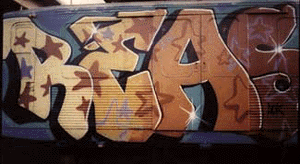
When I got to 8th grade in '82 I was introduced to trains. I met a writer who wrote CIST ONE in the hallway. He invited me to go tosome layups in Brooklyn and introduced me to a lot of writers in the school:SEK, REC, ARC, KEPSTER, IE, DASHER. These guys all knew more than me about what I was getting into. They had better handstyles. SEK was really good at piecing. I was really hyped on the whole thing. I could draw so I could piece, but I was being introduced to styles I couldn't comprehend.
Every morning I also rode the train, the cc and the a, to school. So now Iz the Wiz, Min, Quick, Sr, Python, Bo and all the writers from those lines were catching my eye. And some days I'd go to the 1 line and see CIA, FBA, RTW or TNT's latest work, or whoever, roll through and just sit waiting for the next train.
It would take me about 20 minutes to leave a station because I was studying those trains and I'd be afraid I'd miss a good lesson if I left.
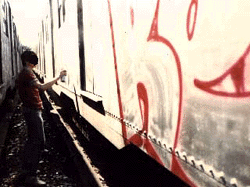 The moment I saw that Sab Kaze by Tack and Kaze
with the shark roll up I freaked out. It was brand new and they drew a shark
character in a style I'd never witnessed. The whole thing blew my mind. By that
time I had been hitting insides and done some crummy outside pieces.
The moment I saw that Sab Kaze by Tack and Kaze
with the shark roll up I freaked out. It was brand new and they drew a shark
character in a style I'd never witnessed. The whole thing blew my mind. By that
time I had been hitting insides and done some crummy outside pieces.
School was shit so I focused on getting good at writing. That whole early era was a very rough ride. A lot of beef I couldn't handle. A lot of going through turbulance, but I continued. Everyone had beef everyone wanted to rob each other. And down in a subway tunnel there's no law. And even if I got out of there OK the chance your piece or throwups and insides get gone over were 50/50. There was no room. So you usually had to go over something. And guys that did lots of throwups treated them like their pieces. Eventually whoever sticks with it stands out and you become known. Most people get bored, quit and fade out. I'd say by '85 I was starting to get some good notice. By '87 I stopped to come back in '89 and rode the trains out.
Part 2
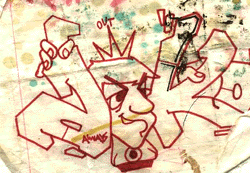 AC:
What crews are in or have you been down with?
AC:
What crews are in or have you been down with?
Reas: Early
on SNS Renard's KGB TDT. Then BYI AOK COD RIS.
AC: Who influenced you in the beginning? Do you count
anyone as an influence?
Reas: Everyone who was doing it
when I started. But closely I'd say Ghost.
AC: Why did you start writing?
Reas:
For the fun and the fact that a young kid like myself then could go do something expressive whether just a tag or a piece. And it was our own thing.
AC:Has your reason for writing changed at all?
Reas: Yes, and I don't really consider myself an active
writer. It interests me but the whole thing changed with time so it's not even
the same itself.
AC:In that kids don't take it as seriously? Or that people buy
their paint or zines, or what?
Reas: I don't know if they
take it seriously or not. I see stuff so I guess they do, it's just totally
different in many ways. The one thing remains--writing a name.
AC: What are the differences between what's going on today
and what you were doing back when you started? Are these differences good,
bad or indifferent?
Reas: I don't identify with it the
same. It's two totally different things. Maybe more than two. As long as the
"writers" now enjoy their version of it, that's cool.
AC:
What crews are in or have you been down with?
Reas: Early
on SNS Renard's KGB TDT. Then BYI AOK COD RIS.
AC: Who influenced you in the beginning? Do you count
anyone as an influence?
Reas: Everyone who was doing it
when I started. But closely I'd say Ghost.
AC: Why did you start writing?
Reas:
For the fun and the fact that a young kid like myself then could go do something expressive whether just a tag or a piece. And it was our own thing.
AC:Has your reason for writing changed at all?
Reas: Yes, and I don't really consider myself an active
writer. It interests me but the whole thing changed with time so it's not even
the same itself.
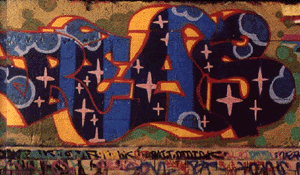 AC:In that kids don't take it as seriously? Or that people buy
their paint or zines, or what?
AC:In that kids don't take it as seriously? Or that people buy
their paint or zines, or what?
Reas: I don't know if they
take it seriously or not. I see stuff so I guess they do, it's just totally
different in many ways. The one thing remains--writing a name.
AC: What are the differences between what's going on today
and what you were doing back when you started? Are these differences good,
bad or indifferent?
Reas: I don't identify with it the
same. It's two totally different things. Maybe more than two. As long as the
"writers" now enjoy their version of it, that's cool.
Part 3
AC: What about the clean train "movement"? Is it cool, or
not even worth mentioning?
Reas: I think most people know
what I think and have done.
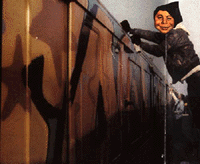 AC: Could you maybe talk about some of the stuff that you and
Ven did after the trains first started really being buffed? Was there anyone
else bombing them with you then?
AC: Could you maybe talk about some of the stuff that you and
Ven did after the trains first started really being buffed? Was there anyone
else bombing them with you then?
Reas: For a year no one
really, only about 15 people. It was really a joke. It was never easier.
AC: What do you think of freights? Ever done any?
Reas: I've done some. They can be fun.
AC: What do you think of Europe and graffiti?
Reas: It depends on who's doing it. I do have one thing to
say, I think some of the stuff is very imaginative and I don't mean techniques,
like some letters are very good. I know some cool guys from there and I really
had great fun.
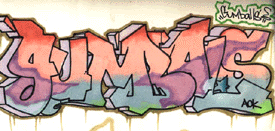 AC: Where have you painted in Europe?
AC: Where have you painted in Europe?
Reas: Amsterdam, Norway, London. I've been to other
places also.
AC: Is/was there any train scene that rivaled what you knew
in New York?
Reas: Don't make me laugh.
Part 4
AC: How does graffiti fit into the art world and art
history, if at all?
Reas: Fuck. I don't know--and it fits
in where and when it came in.
It's its own thing. It doesn't need to be told what it is.
If kids pick up a can to create when they are influenced by [what they are seeing] then, that's it. And the history is in the late '60s early '70s here in NYC and Philly, now it continues everywhere.
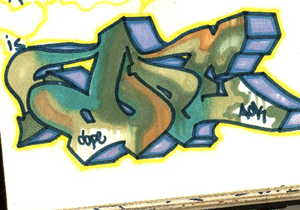
If you create a body of work and are aiming to [be recognized in the art world], then fine. But to be recognized for writing has nothing to do with that. That's what trains and walls are for.
If you don't get up you don't get recognized.
AC: What do you think of the way graffiti has been
documented thus far? (incl. Subway Art, zines, videos)
Reas: It's the new bench. Too bad it costs money. It used
to be free and anyone could get their chance to be seen. But now it's up to
whomever makes a product to decide what you see.
AC: What do you think of documenting graffiti on the
internet?
Reas: I'm not sure yet. It costs money, but at
least you can be anyone and get seen. I like it better than magazines.
AC: There anything that you want to tell kids coming up?
Reas: I really don't.
This document is archived at https://www.graffiti.org/interviews/reas/